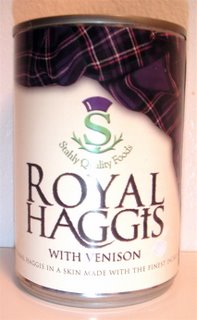Canned Haggis and Other Culinary Delights
 My dear mom brought me home a couple of cans of Haggis when she went to Scotland last month. I was thrilled. I hadn't had any since my aunt made some a few years ago. I don't count my visit to St. Andrews, the Scottish-themed bar and restaurant near Times Square in New York. The haggis there tasted weak, unseasoned.
My dear mom brought me home a couple of cans of Haggis when she went to Scotland last month. I was thrilled. I hadn't had any since my aunt made some a few years ago. I don't count my visit to St. Andrews, the Scottish-themed bar and restaurant near Times Square in New York. The haggis there tasted weak, unseasoned. What exactly is haggis? It's offal. Pardon the pun. But it is -- according to an article I found in The Scotsman (where else?)--
"Haggis is made from lamb offal, most commonly lungs, sometimes beef fat, oatmeal, onions and seasoning particular to each maker, which can include such additions as white pepper, mace, thyme, salt and coriander. They are boiled or steamed and careful measurement of the amount of filling is required to ensure that the grains swell by the right amount to fill the skin. It is possible to make haggis in a domestic kitchen but as the casing is traditionally sewn shut the method requires the cook to also be handy with a needle."That casing is sometimes a sheep's stomach.
As Scottish as haggis is, there are apparently those who argue that its origins lie in France or Scandinavia. The word haggis may come from the Swedish word for 'chop,' which is hagga (so say Scottish haggis purveyors the MacSweens).
The English writer P.G. Wodehouse supposedly wrote that he never liked haggis on account of Shakespeare's Macbeth:
There is no doubt that Shakespeare has rather put us off the stuff.... You remember the passage to which I refer? Macbeth happens upon the three witches while they are preparing the evening meal. They are dropping things into the cauldron and chanting "Eye of newt and toe of frog, wool of bat and tongue of dog," and so on, and he immediately recognises the recipe. "How now, you secret, black and midnight haggis," he cries shuddering.I read somewhere that there are scholars that believe that it was haggis -- bad haggis -- that caused Macbeth's hallucinations. I want desperately to believe that.
For contemporary Scotland, haggis is forever linked to one of its favorite sons, the great poet Robert Burns. Rabbie Burns, as he's affectionately called, wrote "Auld Lang Syne," the song we associate with New Year's Eve. Burns (1759-1796) was a poet, a farmer, a tax collector, father of many illegitimate children, and a Freemason.
My first taste of haggis was at a Burns Night Dinner at a Masonic Lodge. Freemasons and Scots alike celebrate Burns Night every January 25th, the poet's birthday. An essential part of every Burns celebration is a recitation of his great poem, "Address to a Haggis," which is written in such a thick Scottish dialect as to be near incomprehensible to the modern American. Here it is in full:
Address to a Haggis.The word 'sonsie' in the beginning apparently means 'cheerful.' See the link above for a more complete translation of the poem.
Fair fa' your honest, sonsie face,
Great chieftain o the puddin'-race!
Aboon them a' ye tak your place,
Painch, tripe, or thairm:
Weel are ye wordy of a grace
As lang's my arm.
The groaning trencher there ye fill,
Your hurdies like a distant hill,
Your pin wad help to mend a mill
In time o need,
While thro your pores the dews distil
Like amber bead.
His knife see rustic Labour dight,
An cut you up wi ready slight,
Trenching your gushing entrails bright,
Like onie ditch;
And then, O what a glorious sight,
Warm-reekin, rich!
Then, horn for horn, they stretch an strive:
Deil tak the hindmost, on they drive,
Till a' their weel-swall'd kytes belyve
Are bent like drums;
The auld Guidman, maist like to rive,
'Bethankit' hums.
Is there that owre his French ragout,
Or olio that wad staw a sow,
Or fricassee wad mak her spew
Wi perfect sconner,
Looks down wi sneering, scornfu view
On sic a dinner?
Poor devil! see him owre his trash,
As feckless as a wither'd rash,
His spindle shank a guid whip-lash,
His nieve a nit:
Thro bloody flood or field to dash,
O how unfit!
But mark the Rustic, haggis-fed,
The trembling earth resounds his tread,
Clap in his walie nieve a blade,
He'll make it whissle;
An legs an arms, an heads will sned,
Like taps o thrissle.
Ye Pow'rs, wha mak mankind your care,
And dish them out their bill o fare,
Auld Scotland wants nae skinking ware
That jaups in luggies:
But, if ye wish her gratefu prayer,
Gie her a Haggis!
Haggis is traditionally served with "neeps" and "tatties," which are mashed turnips and mashed potatoes. These particular turnips are known in America as rutabagas. However, as the Scotsman's Jane Laidlaw notes,
It goes well with pheasant, chicken and steak, and makes a good stuffing for onions and baked potatoes. Haggis Cannelloni, Ravioli and Lasagne sound culturally mixed-up to someone who hasn’t tried them but there is no reason haggis and pasta shouldn’t integrate as happily as Scots and Italians.
 And though it may sound like a gross oxymoron, there is, thanks to an enterprising Scot named John Macsween, a vegetarian haggis, a concoction made with kidney beans and lentils. An Edinburgh butcher recently introduced a halal haggis for Muslims after lots of requests. An Indian food company in Scotland makes haggis samosas. During my last trip to Scotland I became fond of a deep-fried and battered haggis I found at an Edinburgh chip shop. Whatever variety you choose, just make sure you serve it with a bit of scotch. And perhaps a glass of Irn Bru, Scotland's other national drink.
And though it may sound like a gross oxymoron, there is, thanks to an enterprising Scot named John Macsween, a vegetarian haggis, a concoction made with kidney beans and lentils. An Edinburgh butcher recently introduced a halal haggis for Muslims after lots of requests. An Indian food company in Scotland makes haggis samosas. During my last trip to Scotland I became fond of a deep-fried and battered haggis I found at an Edinburgh chip shop. Whatever variety you choose, just make sure you serve it with a bit of scotch. And perhaps a glass of Irn Bru, Scotland's other national drink. I enjoyed my first can of haggis with a bit of both, along with a splash of whisky over the haggis itself. I managed to mash some potatoes (or rather my dinner guest did), but I wasn't able to procure those blasted rutabagas. I'm afraid I don't know where to look. Are they out of season? Who knows. But my dinner was superb.
Haggis resources on the web:
- The Scotsman's haggis-related news stories
- Robert Burns vs. Sir Walter Scott in academia
- Haggis from Texas: Caledonian Kitchen -- it's lung-free.
- Scottish haggis from McKean's, is now available in America
- Myer's of Keswick in New York sells canned haggis.
- Macsween of Edinburgh, creators of the first vegetarian haggis. A good source of information and recipes, but Macsween's does not mail overseas.
- The Scotsman on Stahly's new Chicago haggis operation.
Labels: food


1 Comments:
mmmmmm haggis makes me sonsie
Post a Comment
<< Home